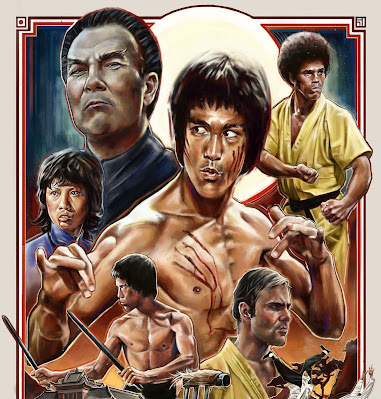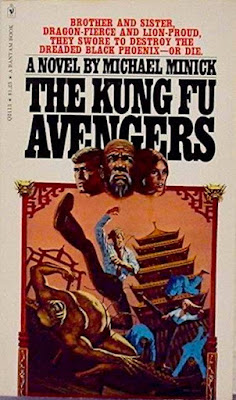The Paperback Kung Fu Phenomenon: Part 2 (Standalone Titles, TV, & the 80s)
The following column was originally printed in Justin Marriott's Paperback Fanatic 47, which was published in July of 2023. You can buy a copy of it here.
As I explained in this column last edition, I spent my teen years in the 1970s absolutely obsessed with all things martial arts. I collected magazines, comics, movies, and attempted to acquire every single paperback book or series that focused on this very specific genre. I was less interested in non-fiction books about the martial arts or individual styles; I was really only interested in the violent pulp fiction that was anchored in manly men (or sexy women) fighting other manly men (or sexy women) in stylized conflict. And thankfully there was no shortage of it for a decade plus.
This time around I want to focus on some additional two-fisted series from that era, including a TV tie-in, a couple of titles that failed to spawn their own series, and some that were birthed in the 80s.
The Way of the Tiger, the Sign of the Dragon (1973)
Chains (1973)
Superstition (1973)
A Praying Mantis Kills (1974)
All 4 books in this series were novelizations of episodes of the popular TV show, detailing the adventures of half Caucasian, half Chinese Kwai Chang Caine, raised from boyhood in a Shaolin temple where he became highly proficient in Kung Fu. After killing a man, Caine is forced to leave China and ends up in the wild west of lawless frontier America. Two of these tie-ins were written by Ron Goulart, one by Barry Malzberg, and the last by Lou Cameron. Overall these are pretty dry though they do add a lot more detail than the original episodes upon which they’re based. Their largest offense? They lack action and are a pretty ponderous bore filled with what Caucasian authors thought sounded like Chinese philosophical musings.
Kung Fu Master Richard Dragon: Dragon’s Fists by Jim Dennis
Dragon’s Fists (1974)
Dragon’s Fist was clearly intended to launch a book series based around the main character of the appropriately named Richard Dragon. Author Jim Dennis was in reality comic book writer Denny O’Neil. Though the book series never took off, O’Neil relaunched Dragon the next year as a comic book character for DC Comics to much better results. In this standalone adventure, Dragon is an orphaned young thief, caught and raised into adulthood by martial arts master O-Sensei who forges the young man into a weapon. He joins a clandestine government agency, G.O.O.D. (Global Organization of Organized Defense), as an operative, but eventually settles down to teach martial arts until a female friend is kidnaped by The Swiss, a very 70s-era James Bond-style villain. The action scenes are electric, but the plot is convoluted with the flow constantly interrupted by flashbacks. The paperback cover by Chris Achilleos is fantastic, though!
The Kung Fu Avengers by Michael Minick (1975)
Minick was an author who knew his stuff when it came to Kung Fu. He authored the non-fiction Kung Fu Exercise Book and The Wisdom of Kung Fu. It is of further note to the readers of this publication that he also served as editorial director of Man’s World, Action for Men, and True Action magazines. So clearly readers are in the hands of a man who can churn out one satisfying bone-crunching action novel grounded in legitimate martial arts knowledge, right? Unfortunately, the author’s skillset might be exclusively for editing more so than effective prose. Throughout this volume which seemed clearly intended to launch a series, far too much time is focused on the origin of twin siblings, Ben and Jan Wade, and the circumstances that lead to them being raised in a Shaolin temple during early Communist China rule. This in turn segues into pages devoted to presenting opposing political ideologies and their relation to Chinese philosophy. What it doesn’t lead to is a straightforward narrative with momentum punctuated by bloody action despite much globetrotting and a nefarious villain. There are numerous action scenes, but everything is sadly sanitized and devoid of any sexual elements whatsoever. In the end it’s really just a slog in spite of a truly spectacular Ken Barr cover painting.
Six-Gun Samurai/Six-Gun Warrior by Patrick Lee
Six-Gun Samurai (1981)
Bushido Vengeance (1981)
Kamikaze Justice (1981)
The Devil’s Bowman (1981)
Bushido Lawman (1982)
Prairie Caesar (1982)
Apache Messiah (1982)
I sought this series out for years and finally pieced the whole run together before reading the first book. My time and efforts were unfortunately not very well-rewarded. As was the case with many men’s adventure series, Six Gun Samurai was actually authored by 3 different writers all working under the house name of Patrick Lee; this first book’s copyright is attributed to Mark Roberts, who also wrote the odd-numbered books in The Penetrator series. The first book in this short-lived 7-book series introduces us to Tommy Fletcher, son of American missionaries to Japan in the mid-1800s. After a massacre leaves him orphaned, Fletcher is taken in by a samurai and trained in the art of Bushido, learning not only karate, but many different weapons forms. Ultimately this becomes a revenge tale (the most popular incentive in most martial arts pulp) as Fletcher travels to the American West to track down those responsible for the killing his family. It is mean-spirited, ultra-violent, and perversely obsessed with rape and butchery, even against children. Not recommended to anyone but completists, like me. The last two books went through a title change from Six-Gun Samurai to Six-Gun Warrior, perhaps in an attempt to broaden appeal but alas, the series ended 2 books later.
Ninja Master by Wade Barker
Vengeance is His (1981)
Mountain of Fear (1981)
Borderland of Hell (1982)
Million-Dollar Massacre (1982)
Black Magician (1982)
Death’s Door (1982)
The Skin Swindle (1983)
Only the Good Die (1983)
Serpent’s Eye (1985)
Phoenix Sword (1986)
War of the Ninja Master by Wade Barker
The Shibo Discipline (1988)
The Himitsu Attack (1988)
The Zakka Slaughter (1988)
Where to even begin with this series (actually 3 separate inter-connected series)? Primarily written by Ric Meyers (under the house name of Wade Barker), this is a wildly uneven run of paperbacks that can cause the reader to experience whiplash as the foundational concept and traits of the main characters change drastically multiple times over the course of its surprisingly long 16-book total run. Individual books are highly entertaining in true pulp fashion with copious amounts of violence, sex, and general sleaze. This is true mostly of the entries credited to Meyers. However, interspersed are individual entries that are guilty of bad plotting, horrific continuity errors, and worst of all, just being a bore. Main character, millionaire Brett “Ninja Master” Wallace, is at his core a nihilistic variation on Batman, keeping his eye on nefarious evil goings on and wading into battle against it like a whirlwind of death, exhibiting powers and skills that elevate him to the level of a supernatural being or a superhero. This aspect robs the books of almost any suspense, though the gory demise of the villains is always assured. Once the initial 8-book run was complete, the series was reborn not once, but twice as a sideways reinvention of itself with even more confusing character and plot developments. While individual entries can be fun, overall this was a disappointment for me, especially as by this point in time I was pretty forgiving and just looking for a nostalgia-binge.
Chant by George Chesbro
Chant (1986)
Chant: Silent Killer (1987)
Chant: Code of Blood (1987)
Dark Chant in a Crimson Key: A Mongo Mystery (1992)
Let me start with a qualifying statement: George Chesbro can write! The author of the highly acclaimed series of Mongo mystery novels is a legitimate wordsmith of the highest level and he’s smart, too. Thankfully those attributes carry over into the Chant series. Though they are by-lined as “mysteries,” the martial arts aspect of the character of John “Chant” Sinclair is front and center throughout this 3-book series penned under the alias of David Cross. The character would appear one final time in a cross-over book in the author's Mongo series. Chant is a professional assassin and master of disguise who carefully chooses each assignment based on his own personal reasons. There is a welcome streak of humor that runs throughout this series. However, when action is required, Chesbro is up to the task and proves himself to be more than capable of describing the mayhem in visceral, cinematic terms using a far more literary prose style than anything covered within this column in this edition. The plots are twisty and far more complicated than would seem necessary. Highly recommended!
Shadow Warrior by Joseph Rosenberger
Hong Kong Massacre (1988)
Caribbean Blood Moon (1988)
Ninja Nightmare (1988)
Hell Wind in Burma (1988)
The originator of The Death Merchant and creator of Kung Fu featuring Mace returns to the martial arts genre with this short-lived 4-volume series that is focused on Scott Waylon McKenna, the first non-Japanese master of Ninjutsu. He is described as an expert in strategy, survival, sabotage, and swift, silent kills. In truth, McKenna is just another Rosenberger protagonist with martial abilities that far exceed any ability to hold the reader’s interest. This is a hyper-violent series that further serves to provide the bizarre stream-of-consciousness politically-driven rhetoric of its author. Like the Mace books authored by Rosenberger, the fight scenes just go on and on and on in excruciating numbing detail without ever really playing out effectively in the mind. Well done action prose becomes like internal cinema that resonates and excites. Recommended for completists only (unless The Death Merchant series is really your thing).
Here is the link to Part 1 of this overview.














Comments
Post a Comment